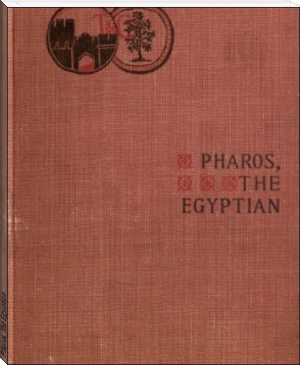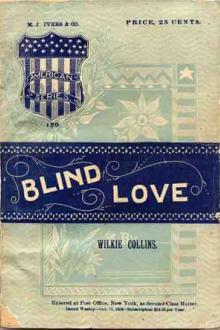Pharos, The Egyptian - Guy Boothby (motivational novels .TXT) 📗

- Author: Guy Boothby
Book online «Pharos, The Egyptian - Guy Boothby (motivational novels .TXT) 📗». Author Guy Boothby
It must have been upward of half an hour later when the tall Arab, who had all the way walked in front of the camel upon which Pharos was seated, stopped and held up his hand. The animals immediately came to a standstill. Peering into the darkness ahead, I found that we were standing before a gigantic building which towered into the starlight. This proved to be the main pylon of the great Temple of Ammon, the most stupendous example of human architecture ever erected on the surface of our globe. On either side of the open space upon which we stood, rows of kriosphinxes showed where a noble road had once led from the temple to the river.
At a signal from Pharos the man who had boarded the steamer that afternoon left us and entered the building, leaving us outside.
Fully five minutes must have elapsed before he returned. When he did so he said something to Pharos in a low voice, who immediately descended from his camel and signed to me to do the same. Then we, in our turn, approached the gigantic pylon, at the entrance of which we were met by a man carrying a lighted torch. Viewed by this dim and uncertain light the place appeared indescribably mysterious. Overhead the walls towered up and up until I lost sight of them in the darkness. Presently we entered a large court--so large indeed that even with the assistance of the guide's torch we could not see the farther end of it. Then passing through a doorway formed of enormous blocks of stone, the architrave of which could scarcely have been less than a hundred feet from the ground, we found ourselves standing in yet another and even greater hall. Here we paused, while Pharos went forward into the darkness alone, leaving me in the charge of the tall Arab and the man who carried the torch. Where he had gone, and his reason for thus leaving me, I could not imagine, and my common sense told me it would only be waste of time on my part to inquire. Minutes went by until perhaps half an hour had elapsed, and still he did not return. I was about to make some remark upon this, when I noticed that the man holding the torch, who had hitherto been leaning against a pillar, suddenly drew himself up and looked toward another side of the great hall. I followed the direction of his eyes and saw an old man approaching me. He was clad in white from head to foot, and with a long white beard descending to within a few inches of his waist. He signed to me to follow him, and then turning, led me across the hall in the direction he had come. I followed close at his heels, threaded my way among the mighty pillars carved all over with hieroglyphics, and so passed into yet another court. Here it was all black darkness, and so lonely that I found my spirits sinking lower and lower with every step I took. Reaching the centre of my court my guide stopped and bade me pause. I did so, whereupon he also departed, but in what direction he went I could not tell.
Had it been possible, I think at this stage of the proceedings I should have left Pharos to his own devices, and have made my way out of the ruins and back to the steamer without waste of time. Under the circumstances I have narrated, however, I had no option but to remain where I was, and in any case I doubt whether I should have had time to make my escape, for the old man presently returned, this time with a torch, and once more bade me follow him. I accordingly accompanied him across the court, and among more pillars, to a small temple, which must have been situated at some considerable distance from the pylon through which we had entered the ruins.
Approaching the farther corner of this temple, he stooped and, so it seemed to me, touched something with his hand. At any rate, I distinctly heard the jar of iron on stone. Then a large block of masonry wheeled round on its own length and disappeared into the earth, revealing a cavity possibly four feet square at our feet. As soon as my eyes became accustomed to the darkness I was able to detect a flight of steps leading down into a dark vault below. These the old man descended, and feeling certain that I was intended to accompany him, I followed his example. The steps were longer than I expected them to be, and were possibly some fifty in number. Reaching the bottom I found myself standing in a subterranean hall. The roof or ceiling was supported by a number of elegantly sculptured _papyrus-bud_ columns, while the walls were covered with paintings, every one of which was in a perfect state of preservation. For what purpose the hall had been used in bygone days I could not, of course, tell, but that it had some connection with the mysterious rites of the god Ammon was shown, not only by the frescoes, but by the trouble which had been taken to conceal the entrance to the place.
When we had reached the centre of the hall the old man turned and addressed me.
"Stranger," he said in a voice as deep and resonant as the tolling of a bell, "by reason of the share that has been allotted thee in the vengeance of the gods, it has been decreed that thou shalt penetrate the mysteries of this holy place, the like of which not one of thy race or people has ever yet beheld. Fear not that evil will befall thee; thou art in the hands of the Mighty Ones of Egypt. They will protect thee. Follow me."
CHAPTER XIII.
In describing what occurred after the curious admonition addressed to me by the old man who had conducted me to the subterranean chamber mentioned in the last chapter, I am oppressed by the fear that my narrative may seem too extraordinary to carry with it any semblance of reality. The whole affair, from the moment when we left the steamer until I stood where I now was, had been so mysterious, so unbelievable, I might almost say, that I had passed from stage to stage of bewilderment, scarcely conscious of anything but what was occurring at the moment. In a vague fashion I wondered how it was that these rooms had never been discovered by the hundreds of Egyptologists who, since the time of Napoleon, had explored the temple. That it had not been so brought to light I felt convinced, otherwise the necessity would scarcely have existed for such secrecy as had been shown when I was conducted to it. Besides, I had studied my guide-books carefully on our voyage up the river, and was quite convinced that no mention of such places had been made in any one of them.
Having finished the speech with which I closed the preceding chapter, the old man led me toward a doorway at the farther end of the room. The posts which supported it, and which must have been something like ten feet in width, were covered with hieroglyphics, as were the neighbouring walls. On either side of the doorway stood two enormous kriosphinxes, similar to those which had once lined the avenue between the Temples of Karnak and Luxor. These had the bodies of lions and heads of rams, and were as perfect as on the day when they had left the sculptor's hands, who knew how many thousand years ago. Entering the archway, for archway I should prefer to call it rather than door, I found myself standing between two rows of life-sized statues, all excelling in workmanship, and in the most perfect state of preservation. Though I was not sufficiently learned in Egyptian history to be able to assign names to them, I was nevertheless quite capable of appreciating their immense value, and could well imagine the find they would prove to any Egyptologist who, in days to come, might discover the secret of the stone and penetrate into this mysterious place.
From what I remember, and speaking at a guess, the passage could scarcely have been less than a hundred feet in length and must have contained at least a dozen statues. At the farther end it opened into a smaller chamber or catacomb, in the walls of which were a number of niches, each one containing a mummy. The place was intolerably close and was filled with an overpowering odour of dried herbs. In the centre, and side by side, were two alabaster slabs, each about seven feet long by three in width. A stone pillar was at the head of each, but for what purpose the blocks were originally intended I have no idea.
At a signal from my conductor two beings, I cannot call them men, who from their appearances I should have judged to be as old as Pharos himself, made their appearance, bringing with them certain vestments and a number of curiously shaped bottles. The robes, which were of some white material, were embroidered with hieroglyphics. These they placed about my shoulders, and when they had done so the old fellow who had conducted me to the place bade me stretch myself upon one of the slabs I have just mentioned.
Under other circumstances I should have protested most vigorously, but I was in such a position now that I came to the conclusion that it would not only be useless but most impolitic on my part to put myself in opposition against him thus early in the day. I accordingly did as I was ordered. The two attendants, who were small, thin, and wizened almost beyond belief, immediately began to anoint my face and hands with some sweet-smelling essences taken from the bottles they had brought with them. The perfume of these unguents was indescribably soothing, and gradually I found myself losing the feeling of excitement and distrust which had hitherto possessed me. The cigarettes Pharos had given me on the occasion that I had dined with him in Naples must have contained something of a like nature, for the effect was similar in more than one essential. I refer in particular to the sharpening of the wits, to the feeling of peculiar physical enjoyment, and to the dulling of every sense of fear.
It was just as well, perhaps, that I was in this frame of mind, for though I did not know it, I was about to be put to a test that surpassed in severity anything of which I could have dreamed.
Little by little a feeling of extreme lassitude was overtaking me; I lost all care for my safety, and my only desire was to be allowed to continue in the state of exquisite semiconsciousness to which I had now been reduced. The figures of the men who continued to sprinkle the essences upon me, and of the old man who stood at my feet, his arms stretched above his head as if he were invoking the blessing of the gods upon the sacrifice he was offering to them, faded farther and farther into the rose-coloured mist before my eyes. How long an interval elapsed before I heard the old man's voice addressing me again I cannot say. It may have been a few seconds, it may have been hours; I only know that as soon as I heard it I opened my





Comments (0)